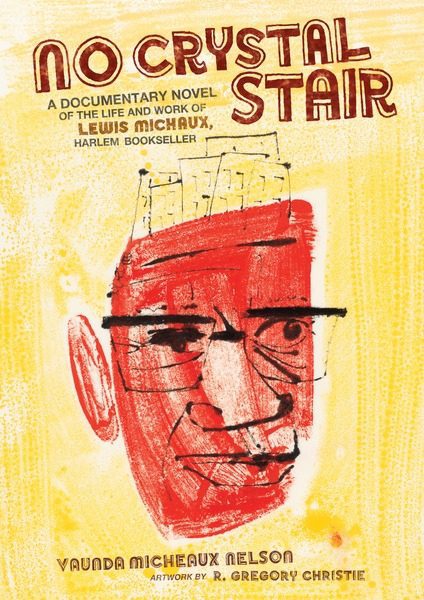Give Me Your Hungry Heart and I’ll Make You a Reader: No Crystal Stair by Vaunda Micheaux Nelson

No Crystal Stair by Vaunda Micheaux Nelson is yet another proof that Carolrhoda Lab is pushing boundaries in diverse ways. Here’s a description of this “documentary novel of the life and work of Lewis Michaux, Harlem bookseller”:
“You can’t walk straight on a crooked line. You do you’ll break your leg. How can you walk straight in a crooked system?”
Lewis Michaux was born to do things his own way. When a white banker told him to sell fried chicken, not books, because “Negroes don’t read,” Lewis took five books and one hundred dollars and built a bookstore. It soon became the intellectual center of Harlem, a refuge for everyone from Muhammad Ali to Malcolm X.
In No Crystal Stair, Coretta Scott King Award-winning author Vaunda Micheaux Nelson combines meticulous research with a storyteller’s flair to document the life and times of her great-uncle Lewis Michaux, an extraordinary literacy pioneer of the Civil Rights era.
“My life was no crystal stair, far from it. But I’m taking my leave with some pride. It tickles me to know that those folks who said I could never sell books to black people are eating crow. I’d say my seeds grew pretty damn well. And not just the book business. It’s the more important business of moving our people forward that has real meaning.”
This is a very special book, and not just because it received a starred review from Kirkus Reviews calling it “a stirring and thought-provoking account of an unsung figure in 20th-century American history.” In these pages, Lewis Michaux emerges as both a flawed human being living in difficult times and as a player in some of the most important events of African-American and American life over 30 years.
As a novel “in documents,” No Crystal Stair weaves together actual materials (articles, FBI files, pamphlets, bits of poetry) with journal-type entries from Lewis Michaux, his family members, prominent authors, and many other figures (some historical, some imagined) that he crosses paths with in the pages of the novel. For example, we hear from the banker who turns him down for a loan when he wants to start the bookstore; from his sister-in-law who disapproves of his politics and doubts his faith; from authors on the rise, like Nikki Giovanni; from reporters; and (my favorite!) from teenagers who get turned onto books because of his recommendations.
Not all the voices in the novel are perfectly distinct, but that’s okay. Because by the end, we’ve got a gorgeous portrait of a life that’s full of nuggets of wisdom, little-known facts about life in Harlem, spot-on portrayals of debates on race and civil rights (integration or independence? accomodation or confrontation? violence or patience?), and anecdotes that you’ll want to tuck into the pockets of your heart. A few of my favorite quotations from the book:
Lewis: “If a sexy book gets them in the door, I’ll show them a sexy book. Then I’ll show them Douglass or DuBois or something else of value. If you’re in the book business, you’ve got to sell books.”
Lewis: “I found out who the real Lord is. That is the landlord. He comes to see me every month. So praying doesn’t get it. Work gets it. And I’m working hard.”
Elder Lightfoot, Lewis’s brother: “If there’s no devil, who gets the credit for raising all the hell?” and “Be willing to help anybody who is down, but don’t go down helping him.”
Snooze (teenage male): “Man, how does Hughes know this stuff? It’s like he’s inside my head. Like he’s reading my mind. I, too, sing America. I read it over and over. It carves itself deep in my mind ’til it sticks. I can’t shake it. Don’t want to.”
Lewis: “Until the neglected and the rejected are accepted and respected, there’s gonna be no damn peace . . . nowhere! Only a tree will stand still while it’s being chopped down” (after assassination of Martin Luther King, Jr.).
This is a book with much, much heart. In addition to being lovingly executed, it’s flawlessly researched. It’s a beautiful example of multi-genre research that teachers can share with students of all ages. Tom Romano–the guru of multi-genre research–would be thrilled with this book.
Bravo. I’m proud to be in such fine company at Carolrhoda Lab.




